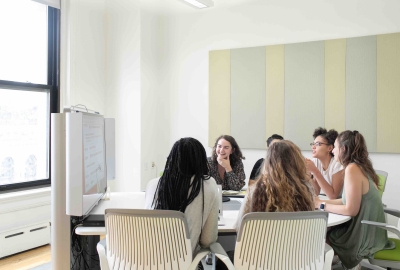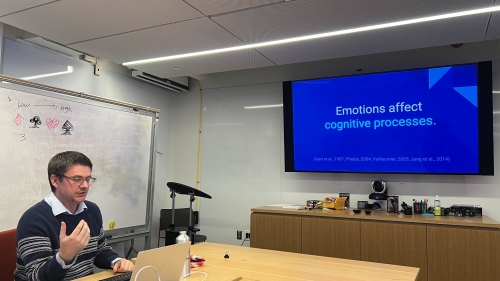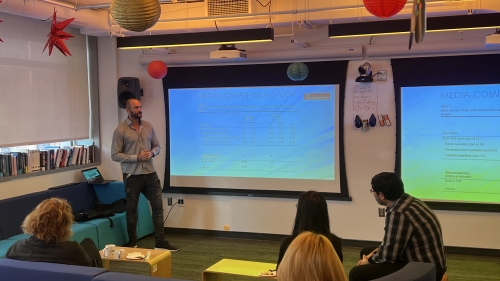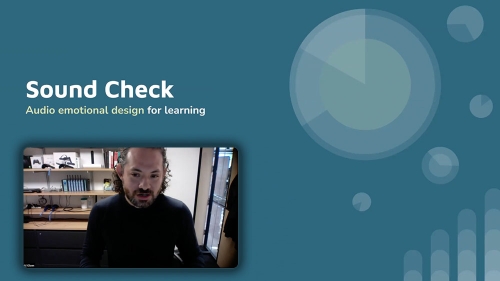
ECT Brownbag Research Presentations

Forging a Path for Researching Narrative Design and Emotional Design in Game-Based Learning
April 18, 2024, 12:00 pm -1:00 pm EST
Presented by Jeff Brenneman
In the field of game-based learning, one of the challenges facing scholars and practitioners alike is determining how the emotions induced in players during gameplay experiences affect their ability to learn (Loderer at al., 2019; Loderer et al., 2020; Pawar et al., 2019; Plass et al., 2020). Emotional design research on learning games so far has skewed heavily toward visual aesthetics (Pawar et al., 2019) in games.
My candidacy paper focuses on narrative, which is under-represented in this research area. There are currently only a handful of studies on the impact of game narrative on players’ emotions and a number of promising directions for future work (Bowers et al., 2013; Dickey, 2011 & 2019; D’Mello et al., 2014; Milne et al., 2010; Neville, 2010). Furthermore, there appears to be little guidance in the literature regarding how best to design game narrative that aligns with learning objectives (Dickey, 2015 is a rare example).
In my candidacy paper, I look deeply at this issue and consider what actually constitutes game narrative, as well as how game narrative might support learning. I also review several existing studies on the impact of game narrative on players’ emotions and learning. In particular, I look at the specific elements of game narrative that were studied and the methodological approaches used. I conclude with a discussion around several research avenues that have the potential to bear fruit in the near future.

VR and Learning - An Immersive Relationship
October 24, 2023, 12:00 pm - 1:00 pm EST
Presented by Fabian Froehlich
Interacting with objects in virtual reality (VR) can be an exciting experience. In the world of education, immersion matters. VR opens up a new dimension, making learning come alive. But here's the game-changer - Haptic Feedback. It's not just about what you see; it's about what you feel. This technology has the potential to impact the quality of education by making it more engaging and interactive.
We all know that feedback is the secret sauce for learning. Whether it's polishing your skills, mastering a concept, or refining your craft, feedback is the compass that guides you. With haptic feedback, you're not just seeing and hearing, you're physically sensing the learning process. Not all immersive feedback is created equal. We understand that every learner is unique. There's no one-size-fits-all guide. The presentation touches on how VR can be a catalyst to bridge individual differences in education.
Theories are great, but what really matters is practical application. Fabian presented results from two empirical VR experiments we conducted during the last year following the established cognitive learning theories and pedagogical principles.
While much research focuses on visual and auditory feedback, the untapped potential of haptic feedback cannot be ignored. Fabian believes it's the missing piece of the puzzle that can enhance your learning journey. His quest is to unravel the full potential of haptic feedback and its impact on education.

SoundCheck: Audio and Emotions for Learning
Tuesday, October 17, 2023, 12:00 pm – 1:00 pm EST
Presented by Al Olsen
This work is aligned with the research of Virtual Reality Learning Environments (VRLEs), Emotional design, Audio and Emotions, Emotion Sensing and Emotions for Learning.
SoundCheck focuses on audio designs and their effects on learners’ emotions. SoundCheck aims to mediate affect via audio designs with the goal to enhance cognition. A catalogue of audio designs was composed from the ground up following strict heuristics found in the literature of sound, emotion and cognition.
To study these audio designs in VR, two innovations have been put forth: First, the Multilayered Affect-Audio Research System, MAARS, a taxonomy for VRLEs’ audio research and design. And second, a bio-sensing VR research platform, DreamVR, featuring calibrations rooms used to expose participants to auditory stimuli presentations.
The audio designs corresponding to the Feedback and Experiential layers will be tested using MAARS and DreamVR.

